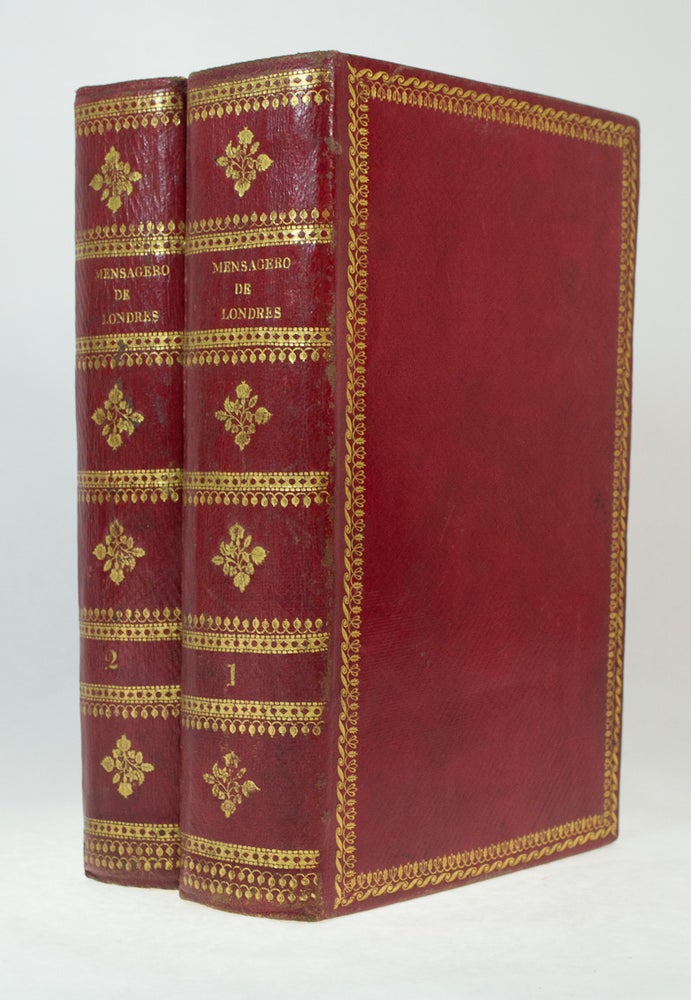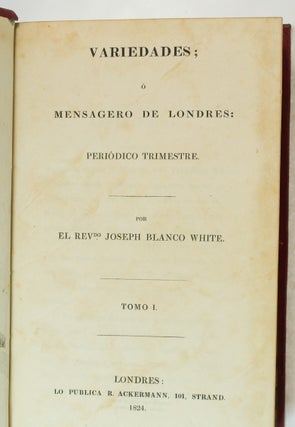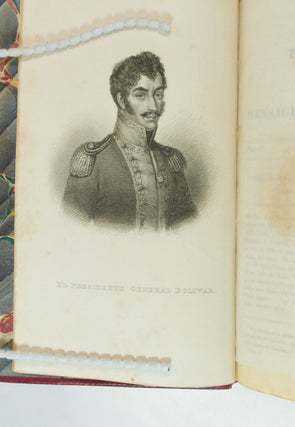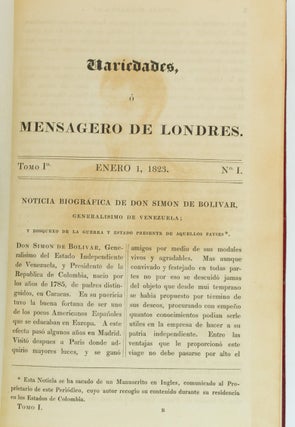Blanco White's Quarterly Journal In Which He Makes the Argument For a Need for "Poetic Translations of Shakespeare." With 108 Engraved Plates.
Variedades; O Mensagero de Londres:. Periodico Trimestre. Tomo I [II].
London: R. Ackermann, 1824.
Variedades; o Mensagero de Londres:. Periodico Trimestre. Tomo I [II]. London: R. Ackermann, 1824-1825.
First edition. Nine numbers in two octavo volumes (9 1/4 x 6 inches; 234 x 151 mm). [4], 102, 101*-102*, 103-499, [1, reference], [2, table of contents]; [2], 399, [1, reference], [2, table of contents] pp. With 108 engraved plates, ninety-nine of which are hand-colored. Each Quarter section with and engraved frontispiece portrait. Also with tow folding facsimile letteres, a folding chart and a copy of a Five Pound Note. White's article on translating Poetical Shakespeare can be found on page 74 of volume I, number I.
Contemporary red diced calf. boards tooled in gilt. Spines stamped and lettered in gilt. Board edges stamped in gilt. Marbled endpapers. A small amount of toning, mainly to title-pages. Some offsetting from plates to text pages. Previous owner's small bookplate on front pastedown of both volumes. Overall a very good set.
"In 1823, about half a century before Velasco published his inaugural translation, we find an article that highlights the need for a 'poetic translation' of Shakespeare's works. The author of the article was Joseph Blanco White, priest, journalist, political and religious thinker, literary critic, and translator. He was born in Seville, in 1775. At that time, his name was José Maria Blanco. His paternal grandfather, William White, had come to Spain from Ireland in the early 18th century to run a mercantile house, and, at some point, the family name was changed to 'Blanco' (Spanish for 'White'). José María had a strict Catholic formation, but, profoundly disappointed with the Church and with Spanish politics, he moved to London in 1810, he converted to Protestantism and he changed his name to Joseph Blanco White. He kept both the Spanish and the English versions of his name side by side, and this doubling reflects an awareness of the double context in which he was writing. He becomes deeply interested in British literature, particularly in the new Romantic ideas, but he never lost sight of the situation in Spain He was concerned with the relations between the Peninsula and its Spanish-American colonies, and he enthusiastically wrote in support of the colonies' autonomy from the Central Council at Seville. In fact, he published his proposal for translating Shakespeare poetically in the quarterly Variedades o Mensagero de Londres, a journal he edited for the London printing house of Rudolph Ackermann but which was addressed to Spanish-American readers. This context is important for understanding Blanco White's theoretical stance. His contact with Romanticism, for instance, gave him tools to defend Shakespeare against the attacks of French and Spanish neoclassicists. He explains that a 'poetic translation' has the benefit of conveying the general 'tone of thought' and the transcendent 'originality of Shakespeare's genius'- even when it cannot reproduce his 'particular beauties' which, for Blanco White, are inseparable from the language in which they were written. But the proposal to translate Shakespeare's works as poetry- by which he meant lyric poetry-has other implicit benefits: it displaces the focus away from the terrain of the theatre and from the standards of unity and decorum that were the stronghold of neoclassicism. Indeed, he explicitly argues that Shakespeare's genius stands apart from the 'frenzies' of the theatre of his time." (The Oxford Handbook of Shakespeare Poetry Pg 696-697).
HBS 66900.
$4,500.
Price: $4,500.00
Item #66900




